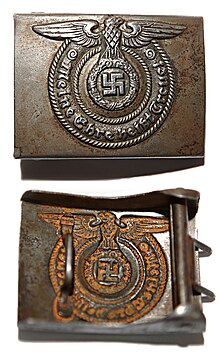Loyalty is my honour

My honor is loyalty was the motto of the Schutzstaffel (SS). Since 1932, the motto was coined in the belt locks of the General SS and its ancillary units ( SS disposable troops, SS skull and crossbones and the Waffen SS, which later emerged from these armed SS units). The SS honor dagger was also provided with it. The Wehrmacht , on the other hand, carried the Prussian motto God with us on the belt lock.
The SS motto or variations thereof are punishable in some countries, in Germany by the Criminal Code ( § 86a StGB, use of symbols of unconstitutional organizations ), in Austria by the Prohibition Act of 1947 .
origin
The motto as the National Socialist slogan goes back to a sentence by Adolf Hitler . Units of the Berlin Sturmabteilung (SA) under Walther Stennes tried to storm the Berlin Gauleitung in 1931 . While the Gauleiter Joseph Goebbels and his employees were able to escape the SA mob, a handful of SS men tried to stop the SA and were beaten up by them. In this way, the Berlin SS under its commander Kurt Daluege had shown in Hitler's eyes an "unwavering loyalty to the Führer" and Hitler sent Daluege a letter of thanks. In this letter of thanks, Hitler wrote the sentence "SS-Mann, your honor means loyalty!" On the basis of this letter, SS chief Heinrich Himmler introduced this sentence shortly afterwards as the SS motto.
meaning
Traditional concepts of virtue such as “honor” and “loyalty” or also “comradeship”, “obedience” etc. were taken from the language of the soldiers and abundantly contained in the SS ideology . However, through a specifically National Socialist usage, the SS gave these words their own meaning. The term “loyalty” was aimed solely at the person of Adolf Hitler and became obedience without contradiction within the SS ideology . This was expressed, among other things, in the oath of the SS men:
“We swear to you, Adolf Hitler [...] loyalty and bravery. We pledge obedience to you and your appointed superiors until death [...] "
By equating the terms “loyalty” and “honor”, a breach of loyalty became a loss of honor. The term “honor” lost its traditional moral content. The honor of a soldier who, out of a sense of honor, might refuse to take part in a war crime, no longer played a role in the SS concept of honor. All that counted was blind obedience.
The projection of the concepts of virtue onto the Fiihrer was necessary in order to achieve unconditional obedience, even with criminal orders. This could not be enforced by law. It required the soldier's voluntariness, which was achieved by reinterpreting these traditional ideals of virtue.
Other slogans
- Wehrmacht, motto: God with us
- German paratroopers , motto: Loyalty for loyalty
- French Foreign Legion, motto: honor and loyalty
- U.S. Marines, Motto: semper fidelis, d. H. forever faithful
literature
- "Our honor means loyalty." War diary of the RFSS command staff , activity reports of the 1st and 2nd SS Infantry Brigade, the 1st SS Cavalry Brigade and special commandos of the SS. Europe, Vienna 1965, again 1985 ISBN 3203508427 .
- Worksheets for film evaluation : "My honor means loyalty." Ed. Citizenship Education Center of the State of North Rhine-Westphalia , Düsseldorf 1960; also: State Working Group on Film for Youth and National Education in Bavaria, Munich 1960.
Web links
- Verfassungsschutz.de: Right-wing extremism: Symbols, signs and prohibited organizations (PDF) ( Memento from January 16, 2015 in the Internet Archive )
Individual evidence
- ↑ Information about "Memorials of National Socialism" of the University of Vienna Here, however, the first person singular ("I") is given.
- ↑ Bernd Wegner, Hitler's Political Soldiers . The Waffen-SS 1933–1945. Concept, structure and function of a National Socialist elite. Schöningh. 9th edition 2010, ISBN 978-3-506-76313-6 .
- ↑ http://www.u-berg.at/texte/foto06.htm Parole of the paratroopers.
- ↑ http://www.klick-nach-rechts.de/gegen-rechts/2001/02/heldengedenken.htm